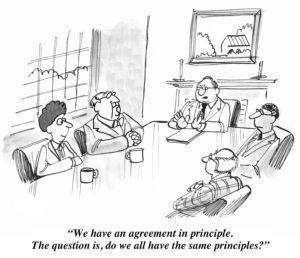I often hear stories about executive hires gone awry, or leadership teams that can’t quite close the deal with their perfect candidate. Most of the time, this is the result of someone believing they can scour their own network in order to identify the right candidate quickly.
Recently, I learned of the following situation and I was struck by the similarity to a scenario in professional sports (more on that in a minute).
In this situation, a candidate for a leadership position (CEO) spent nearly 100 hours – over the course of five months – working to close an opportunity with a company that he’d worked with as a consultant. In other words, he was a known quantity to the company’s investors and board of directors.
Perhaps it was this familiarity that led both sides to believe there was no need for outside “help,” and the investors and board of directors proceeded to negotiate directly with the CEO candidate. In this case, it seems, familiarity led everyone to take the situation for granted.
 Communication Breakdown
Communication Breakdown
Eventually, conversations with the candidate were delegated to a board member who was the key decision maker, but who had joined late in the process. The CEO candidate had a lot of thoughts and made numerous observations, but the hiring process wasn’t set up for discussion, collaboration, or feedback. The candidate also didn’t have a trusted “go to” person who could help him understand things, obtain context, share perspectives, be coached where needed, etc. The board didn’t take the time to understand the candidate’s needs, and its focus was getting the offer out the door and on to the next task.
Of course, the candidate felt this “distance” and began to feel concerned, anxious and started to disengage. He began to draw his own conclusions about things that I’m sure the board would have wanted to know. Appropriate engagement, better conversations, and helpful insights might have elicited a terrific outcome.
Each person had their own vision and wanted a beneficial outcome. Yet, neither side was able to discern and see the interests of both sides. If they did, it was top line at best. And, in life, most critical decisions – especially those that involve a person’s mind and heart – aren’t made in a top line manner.
What Happened?
The fascinating thing is that both parties had worked together for hundreds of consulting hours and otherwise had good relations. Yet, when it came to hiring this candidate as a CEO (an outcome that everyone wanted), communication and engagement halted. They couldn’t come to terms, and the candidate declined the offer. But, what really happened?
 What happened is that both parties lost their compass and focused on things that weren’t the most important things.
What happened is that both parties lost their compass and focused on things that weren’t the most important things.
The board member who joined late in the process overlooked key information and details that really mattered, and the candidate withheld his observations (natural human nature) given the lack of rapport that was established.
Had they been able to have greater visibility to the issues, foster and facilitate better rapport and understanding, they would have had the materials to create a positive outcome for both parties.
The candidate would have been thrilled to accept the offer and would have done so based on the positive impression and experience he had through the recruiting process. The lack of these things caused an outcome that left everyone bewildered, frustrated, and back at ground zero.
In life, most decisions that involve a person’s mind and heart aren’t made in a top line manner.
Every Team Needs A Scout
When hiring for a critical leadership position, the recruiting approach and process must be good!
Think about this in terms of professional sports teams. In professional sports, scouts are experienced talent evaluators who watch athletes play their chosen sports and determine whether their set of skills and talents represent what is needed by the scout’s organization. The best scouts – who help to determine which players will fit in well with an organization – can be the major difference between success and failure for the team with regard to wins and losses, which often relates directly to the organization’s financial success.
And, when professional sports teams extend a contract offer, they consider the player’s personal history, statistical trends, and position-specific wear-and-tear. The team’s scouts and negotiators come to the table with the best information about the player so that they can tailor an offer that meets the player’s professional and personal needs. They focus on his needs and wants in order to make him feel special and valued.
Listen, Communicate, Close the Deal
When you are hiring for a leadership position, it is not enough to know the person in a professional context. You must know more, and that takes time, reflection, conversation and discernment. It doesn’t typically happen in an instant, even though it would be very satisfying to get to the point quickly. Perhaps you assume that because you successfully worked with a candidate in the past that he’ll automatically “fit in” in this new situation. Perhaps you believe you can “short cut” through the evaluation process because your candidate is a known quantity. These are assumptions that too often burn time and leave everyone involved deflated and worn down.
You’re not in the minor leagues any more, and a great executive recruiter is to your business what a great scout is to a professional sports team: A partner who can evaluate talent uniquely right for you. They’ll come to the table with the best information about a candidate so you can extend an offer that is accepted. It’s a win-win situation.

